All products and services are For Research Use Only and CANNOT be used in the treatment or diagnosis of disease.
Creative Biolabs has successfully developed plenty of anti-CD276 CART related products to support global customers’ projects. We are pleased to receive any inquiries about the anti-CD276 CART development, please do not hesitate to get reach to us.
B7-H3 (CD276) is a member of the B7 family that plays an important role in immune regulation in the T cell response, serving as a potential target for tumor immunotherapy. Studies have shown that B7-H3 participates in several key processes, such as inhibiting T cell activation and expansion, taking part in tumor immune escape, and affecting the immune responses and tumor manifestations. Abnormal B7-H3 expression is present in various tumor types, and is related to poor prognosis. B7H3-targeted immunotherapy will be a promising approach for disease treatment.
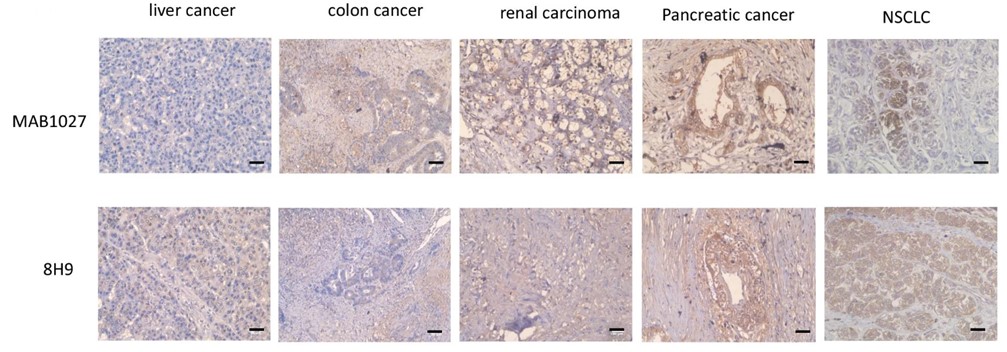 Fig.1 Expression evaluation of B7H3 in various human tumor tissues by IHC method. (Black bar represents 20 μm).1
Fig.1 Expression evaluation of B7H3 in various human tumor tissues by IHC method. (Black bar represents 20 μm).1
Anti-CD276 CAR-T Cell Proliferation Assay
To test the amplification capacity of CAR-T cells, we provide comprehensive proliferation services to aid in customers' projects. Meanwhile, we also provide customized experimental method development according to the different project requirements.
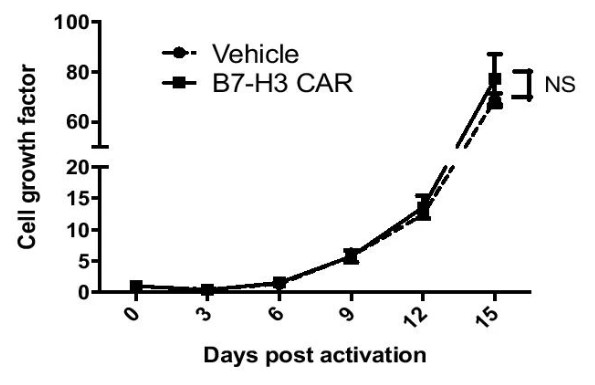 Fig.2 Proliferation testing of anti-B7H3 CAR-T cells under the CD3/CD28 beads activation.1
Fig.2 Proliferation testing of anti-B7H3 CAR-T cells under the CD3/CD28 beads activation.1
Anti-CD276 CAR-T Expression Test
For CAR expression testing, Creative Biolabs provides extensive CAR detection reagents to assess the CAR expression.
Target-specific CAR Detection Reagents
Whitlow218 Linker Antibody
Anti-G4S Linker Antibody
Phenotype Analysis of Anti-CD276 CAR-T
To characterize the CART cell subsets, Creative Biolabs is dedicated to providing comprehensive phenotype analysis service to assess the status of the CART cells, including the reagents and cell preparation for the later experiment analysis. We provide extensive cell marker tests, common marker types include CD4, CD8, CD69, CD25, etc.
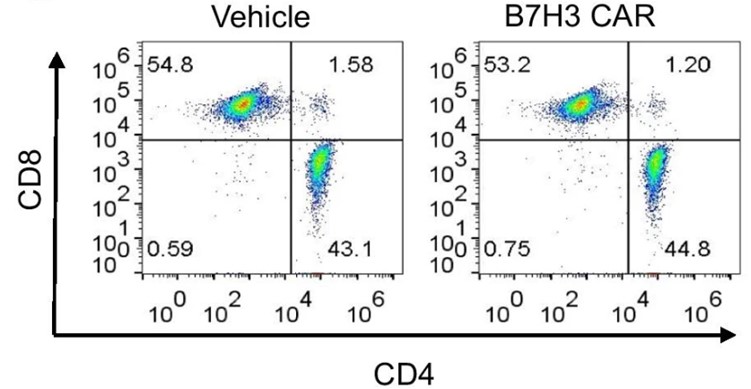 Fig.3 Cell subset analysis of anti-B7H3 CAR-T cells by flow cytometry.1
Fig.3 Cell subset analysis of anti-B7H3 CAR-T cells by flow cytometry.1
Anti-CD276 CAR-T Cytokine Release Test
Cytokine release is often presented in the process of CART cells co-cultured with target tumor cells. Creative Biolabs specializes in providing a variety of methods to evaluate cytokine production.
 Fig.4 In vitro cytokine production analysis in B7H3 CART cells (see H3 CART) co-cultured with different target cells at a 2:1 E:T ratio.2
Fig.4 In vitro cytokine production analysis in B7H3 CART cells (see H3 CART) co-cultured with different target cells at a 2:1 E:T ratio.2
Anti-CD276 CAR-T In Vitro Cytotoxicity Assay
For in vitro cytotoxicity tests, Creative Biolabs has established various methods to assess the efficacy of CART against tumor target cells to meet customers' special needs. Meanwhile, we also provide plenty of tumor cell lines with quality assurance for global customers to choose from.
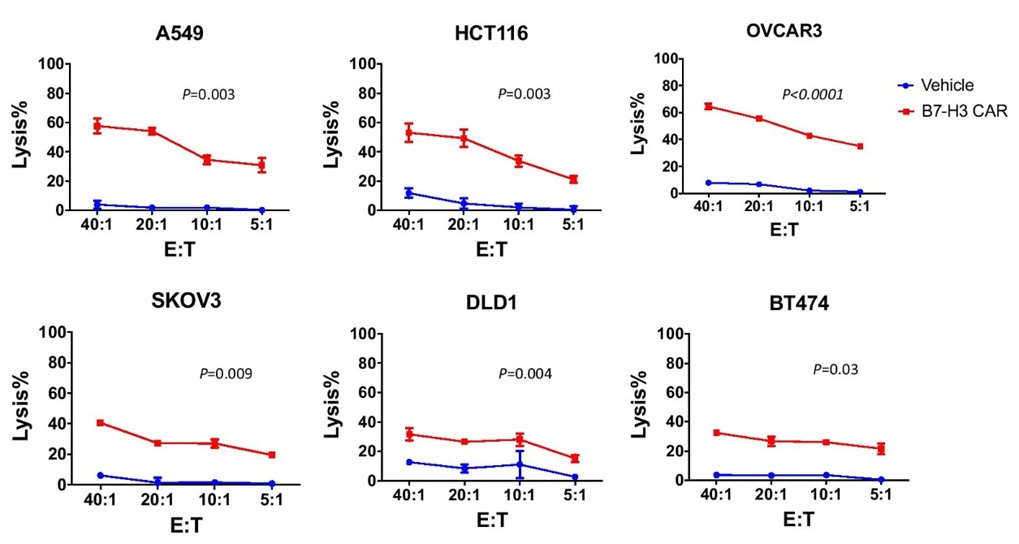 Fig.5 In vitro cytotoxicity assay of anti-B7H3 CAR-T (red line) against 6 different tumor target cells at the indicated E:T ratio.1
Fig.5 In vitro cytotoxicity assay of anti-B7H3 CAR-T (red line) against 6 different tumor target cells at the indicated E:T ratio.1
Apoptosis Test of Tumor Target Cells Induced by Anti-CD276 CART
The apoptosis of tumor target cells by CART cell induction may occur during the co-incubation of two cell types. For apoptosis, we provide a 7-AAD and Annexin V co-staining assay by flow cytometry to test the percentage of apoptosis.
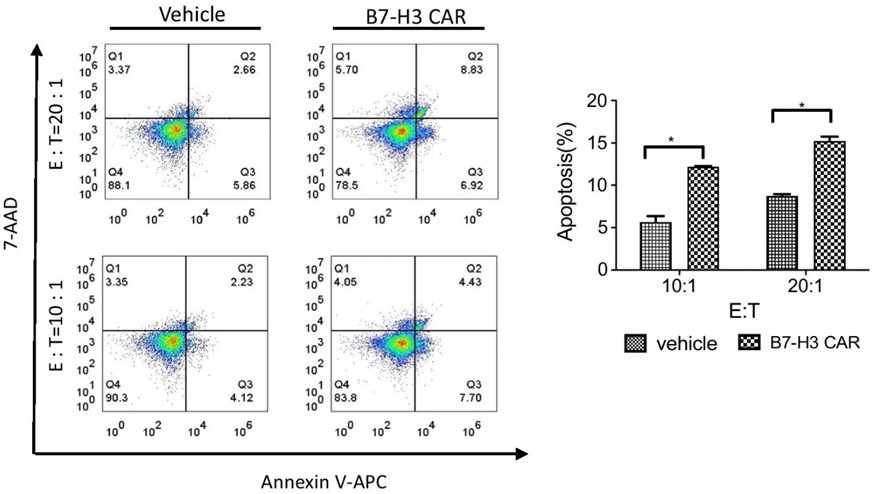 Fig.6 Apoptosis analysis in A549 target cells induced by anti-B7H3 CAR-T cells at indicated E:T ratios by flow cytometry. (Vehicle T cell group as a control group).1
Fig.6 Apoptosis analysis in A549 target cells induced by anti-B7H3 CAR-T cells at indicated E:T ratios by flow cytometry. (Vehicle T cell group as a control group).1
Efficacy Test of Anti-B7H3 CAR-T
To accelerate the CART development, we have established various mouse models and developed several in vivo experimental platforms to assess the efficacy of CAR-T cells to support customers' projects. Our mouse models include but are not limited to cell line-derived xenografted (CDX) models, and patient-derived xenografted (PDX) models, patient-derived organoid models for customers to choose from.
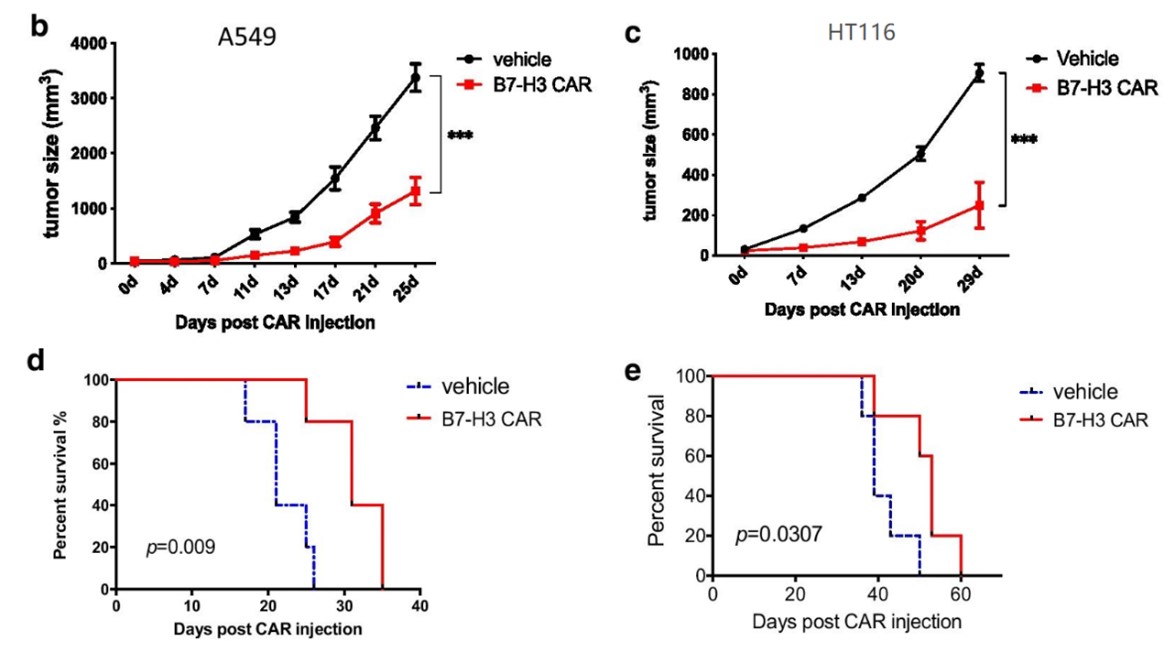 Fig.7 In vivo efficacy evaluation of anti-B7H3 CAR-T cells against A549 xenograft models (fig b, d), or HT116 xenograft models (fig c, e). b-c) Tumor growth measurement in A549-injected mice or HCT 116-injected mice. d-e) Survival curves analysis of A549-injected mice or HCT 116-injected mice.1
Fig.7 In vivo efficacy evaluation of anti-B7H3 CAR-T cells against A549 xenograft models (fig b, d), or HT116 xenograft models (fig c, e). b-c) Tumor growth measurement in A549-injected mice or HCT 116-injected mice. d-e) Survival curves analysis of A549-injected mice or HCT 116-injected mice.1
Toxicity Evaluation Anti-CD276 CAR-T
Toxicity testing is a necessary step in the in vivo evaluation process for CART development. The results of toxicity testing often give us more safety considerations for CAR-T cells. At Creative Biolabs, we offer a variety of methods for relevant detection to assess the treatment effect, such as H&E staining analysis of major organs in animal models treated with CAR-T cells.
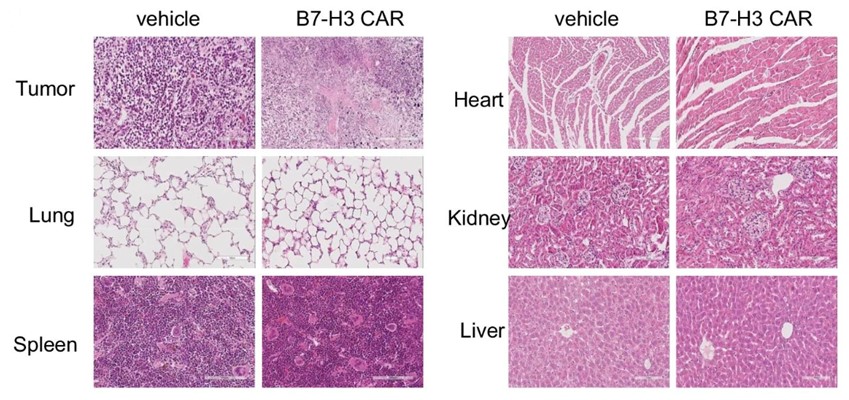 Fig.8 Analysis of treatment effect of anti-B7H3 CAR-T cells in A549 tumor xenografts model. H&E staining analysis of major organs in A549 tumor xenografts mice treated with B7H3 CAR-T cells.1
Fig.8 Analysis of treatment effect of anti-B7H3 CAR-T cells in A549 tumor xenografts model. H&E staining analysis of major organs in A549 tumor xenografts mice treated with B7H3 CAR-T cells.1
Tumor Infiltration Analysis of Animal Model treated with CAR-T cells
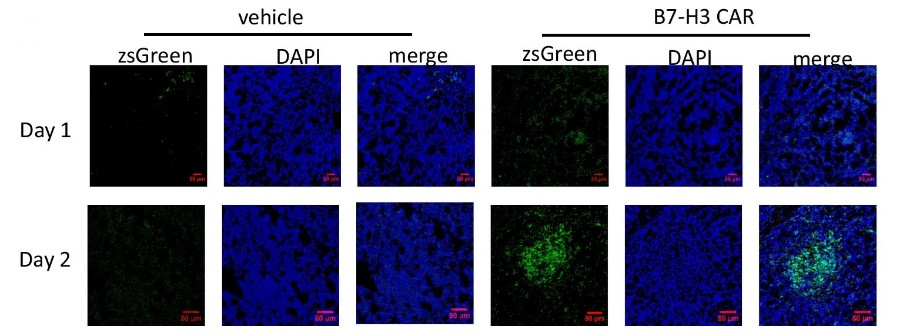 Fig.9 Tumor infiltration analysis of anti-B7H3 CAR-T cells in A549 tumor xenografts mouse model by fluorescence microscope imaging.1
Fig.9 Tumor infiltration analysis of anti-B7H3 CAR-T cells in A549 tumor xenografts mouse model by fluorescence microscope imaging.1
References
 Loading...
Loading...
| CAT | Product Name | Target Species | Antibody Clone | Antibody Host | Receptor Construction | Vector Type | Targeting Cell Type | CAR Vector Type | Inquiry & Datasheet |
| CAR-CQ0223 | Anti-CD276 h(41BB-CD3ζ) CAR, pCDCAR1 (CAR-CQ0223) | Mouse | Rat | scFv-41BB-CD3ζ | Lentiviral vector | T cell | |||
| CAR-CQ0224 | Anti-CD276 h(41BB-CD3ζ) CAR, pCDCAR1 (CAR-CQ0224) | Human | Mouse | scFv-41BB-CD3ζ | Lentiviral vector | T cell | |||
| CAR-CQ0225 | Anti-CD276 (CBXC-0201) h(41BB-CD3ζ) CAR, pCDCAR1 | Human | CBXC-0201 | Mouse | scFv-41BB-CD3ζ | Lentiviral vector | T cell | ||
| CAR-CQ0226 | Anti-CD276 (CBXC-0202) h(41BB-CD3ζ) CAR, pCDCAR1 | Human | CBXC-0202 | Mouse | scFv-41BB-CD3ζ | Lentiviral vector | T cell | ||
| CAR-CQ0227 | Anti-CD276 (CBXC-2673) h(41BB-CD3ζ) CAR, pCDCAR1 | Human, Pig | CBXC-2673 | Mouse | scFv-41BB-CD3ζ | Lentiviral vector | T cell | ||
| CAR-CQ3647 | Anti-CD276 h(CD28-CD3ζ) CAR, pCDCAR1 (CAR-CQ3647) | Mouse | Rat | scFv-CD28-CD3ζ | Lentiviral vector | T cell | |||
| CAR-CQ3648 | Anti-CD276 h(CD28-CD3ζ) CAR, pCDCAR1 (CAR-CQ3648) | Human | Mouse | scFv-CD28-CD3ζ | Lentiviral vector | T cell | |||
| CAR-CQ3649 | Anti-CD276 (CBXC-0201) h(CD28-CD3ζ) CAR, pCDCAR1 | Human | CBXC-0201 | Mouse | scFv-CD28-CD3ζ | Lentiviral vector | T cell | ||
| CAR-CQ3650 | Anti-CD276 (CBXC-0202) h(CD28-CD3ζ) CAR, pCDCAR1 | Human | CBXC-0202 | Mouse | scFv-CD28-CD3ζ | Lentiviral vector | T cell | ||
| CAR-CQ3651 | Anti-CD276 (CBXC-2673) h(CD28-CD3ζ) CAR, pCDCAR1 | Human, Pig | CBXC-2673 | Mouse | scFv-CD28-CD3ζ | Lentiviral vector | T cell | ||
| CAR-WFY2722 | Anti-CD276 (CBFYC-1197) h(41BB-CD3ζ) CAR, pCDCAR1 | Chicken | CBFYC-1197 | Mouse | scFv-41BB-CD3ζ | Lentiviral vector | T cell | ||
| CAR-WFY2723 | Anti-CD276 (CBFYC-1198) h(41BB-CD3ζ) CAR, pCDCAR1 | Human | CBFYC-1198 | Mouse | scFv-41BB-CD3ζ | Lentiviral vector | T cell | ||
| CAR-WFY2724 | Anti-CD276 (CBFYC-1199) h(41BB-CD3ζ) CAR, pCDCAR1 | Human | CBFYC-1199 | Mouse | scFv-41BB-CD3ζ | Lentiviral vector | T cell | ||
| CAR-WFY2725 | Anti-CD276 (CBFYC-1200) h(41BB-CD3ζ) CAR, pCDCAR1 | Human | CBFYC-1200 | Mouse | scFv-41BB-CD3ζ | Lentiviral vector | T cell | ||
| CAR-WFY2726 | Anti-CD276 (CBFYC-1201) h(41BB-CD3ζ) CAR, pCDCAR1 | Human | CBFYC-1201 | Mouse | scFv-41BB-CD3ζ | Lentiviral vector | T cell | ||
| CAR-WFY2727 | Anti-CD276 (CBFYC-1202) h(41BB-CD3ζ) CAR, pCDCAR1 | Human | CBFYC-1202 | Mouse | scFv-41BB-CD3ζ | Lentiviral vector | T cell | ||
| CAR-WFY2728 | Anti-CD276 (CBFYC-1203) h(41BB-CD3ζ) CAR, pCDCAR1 | Human | CBFYC-1203 | Mouse | scFv-41BB-CD3ζ | Lentiviral vector | T cell | ||
| CAR-WFY5975 | Anti-CD276 (CBFYC-1197) h(CD28-CD3ζ) CAR, pCDCAR1 | Chicken | CBFYC-1197 | Mouse | scFv-CD28-CD3ζ | Lentiviral vector | T cell | ||
| CAR-WFY5976 | Anti-CD276 (CBFYC-1198) h(CD28-CD3ζ) CAR, pCDCAR1 | Human | CBFYC-1198 | Mouse | scFv-CD28-CD3ζ | Lentiviral vector | T cell | ||
| CAR-WFY5977 | Anti-CD276 (CBFYC-1199) h(CD28-CD3ζ) CAR, pCDCAR1 | Human | CBFYC-1199 | Mouse | scFv-CD28-CD3ζ | Lentiviral vector | T cell | ||
| XS-0823-LX15 | Anti-hCD276 (271) ICD(CD28-OX40-CD3ζ) CAR-MA, pAd5f35 Vector | Human | 271 | Adenoviral vectors |
 NEWSLETTER
NEWSLETTER
The latest newsletter to introduce the latest breaking information, our site updates, field and other scientific news, important events, and insights from industry leaders
LEARN MORE NEWSLETTER NEW SOLUTION
NEW SOLUTION
CellRapeutics™ In Vivo Cell Engineering: One-stop in vivo T/B/NK cell and macrophage engineering services covering vectors construction to function verification.
LEARN MORE SOLUTION NOVEL TECHNOLOGY
NOVEL TECHNOLOGY
Silence™ CAR-T Cell: A novel platform to enhance CAR-T cell immunotherapy by combining RNAi technology to suppress genes that may impede CAR functionality.
LEARN MORE NOVEL TECHNOLOGY NEW SOLUTION
NEW SOLUTION
Canine CAR-T Therapy Development: From early target discovery, CAR design and construction, cell culture, and transfection, to in vitro and in vivo function validation.
LEARN MORE SOLUTION